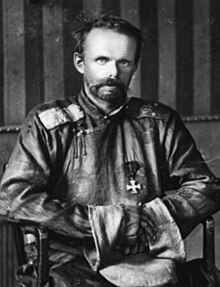This is an old revision of this page, as edited by 209.239.3.4 (talk) at 06:13, 18 May 2005 (m). The present address (URL) is a permanent link to this revision, which may differ significantly from the current revision.
Revision as of 06:13, 18 May 2005 by 209.239.3.4 (talk) (m)(diff) ← Previous revision | Latest revision (diff) | Newer revision → (diff)
Baron Roman Nicolaus Fyodorovich von Ungern-Sternberg (Russian Роман Фёдорович Унгерн фон Штернберг) (January 22, 1886, new style — September 15, 1921) a.k.a. Bloody Baron, lieutenent-general, one of the military commanders on the side of the White movement during the Russian Civil War, later an independent warlord in pursuit of pan-monarchist goals in Mongolia and territories east of Lake Baikal.
Ungern-Sternberg was born on the island of Dago, Russian Empire (now Hiiu County, Estonia) in a family of ethnic German nobility. He graduated from Pavlovsk Military School and participated in World War I. After the February 1917 revolution he was sent by the Provisional Government to the Russian Far East under command of Grigory Mikhailovich Semenov to establish a loyal military presence there. In the following months Ungern-Sternberg distingushed himself by extreme cruelty to the local population and to his own subordinates. He earned the nickname Bloody Baron. Semenov and Ungern-Sternberg, through anti-Bolshevik, were not part of the White movement, and declined to recognize the authority of Admiral Aleksandr Kolchak, the nominal leader of the Whites. Instead, they were supported by the Japanese with arms and money. The Japanese intention was to found a puppet state in the Russian Far East headed by Semenov. For the White leaders, who belived in "Russia strong and indivisonable", this was high treason. Furthermore, Ungern-Sternberg's co-operation with the despised Japanese did not help matters. Ungern-Sternberg’s army comprised a mixture of Russian and Buryat tribesmen who just as often plundered White supply trains as they did Red.
In 1920 he split from Semenov and became an independent warlord. He believed that the monarchy was the only social system which could save Western civilization from corruption and self-destruction. He began to pursue an idea of restoring the Qing Dynasty to the Chinese throne, then uniting Far-Eastern nations under it. A fanatical anti-semitic, he proclaimed in a 1918 Manifesto, his intention "...to exterminate all of the Jews and Commissars of Russia’".
Since 1919 Mongolia was occupied by Chinese republican forces. In late 1920-early 1921 Ungern's troops entered Mongolia at the invitation of the displaced Bogdo Khan (Bogdo Gegen, Bogd Haan, Mongolia's civil and religious ruler. Ungern-Sternberg ordered his troops to burn a large number of camp fires in the hills around the capital town Urga, making an appearance that the town was surrounded by an overwhelming force. In February 1921, without fighting a battle, he drove the Chinese out of town. On March 13 Mongolia proclaimed itself an independent monarchy. Ungern-Sternberg became Mongolian dictator.
In the following months Ungern-Sternberg's troops completely discredited themselves by constant robberies and cruelty to the population. Pro-Soviet Mongolian leader Suhbaatar (Sukhe-Bator) defeated Ungern-Sternberg's forces in Mongolia with the help of the Red Army. In May, Ungern attempted to invade Soviet territory near Troitskosavsk (now Kyakhta, Buryatia). After initial successes in May and June, Ungern-Sternberg was defeated in a July-August counteroffensive, captured by his own soldiers, and given to the Red Army on August 21, 1921.
After a quick military tribunal Ungern was executed by a firing squad in Novonikolayevsk (now Novosibirsk, Russia).
Literature
- Alioshin, Dimitri: Asian Odyssey, New York 1941.
- Hopkirk, Peter: Setting the East Ablaze : On Secret Service in Bolshevik Asia, Don Mills 1986.
- Ossendowski, Ferdinand: Beasts, Men And Gods, New York 1922.